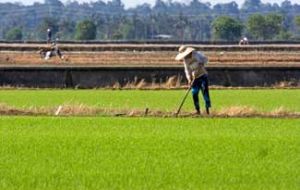MercoPress. South Atlantic News Agency
Global rice production reaches 476 million tons in 2011; strong Mercosur recovery
 Asia is the world’s leading region in rice production
Asia is the world’s leading region in rice production Global rice production is expected to touch 476 million tons in 2011, on the back of improved weather conditions, as the influence of La Niña is expected to neutralize by June, United Nation’s body FAO said.
The recovery of Latin America’s production, particularly in the Mercosur block gave the world harvest a significant boost.
The world rice production reached a new record in 2010, at 464 million tons (696 million tons paddy), up 1.8% from the previous season, FAO said.
“Although very preliminary, world paddy production in 2011, is forecast to expand by 2.5% to 713 million tons (about 476 million tons, milled basis), reflecting expectations of improved weather conditions, as the influence of La Niña is expected to fade away by June,” it said.
In Asia, output is expected to grow by 2.5% to 645 million tons (430 million tons, milled basis), with major increases expected in China and India and a recovery in Pakistan, it added. According to the third advance estimate of the Agriculture Ministry, rice production in India in the 2010-11, season is pegged at 94.11 million tons.
However, the outlook has not been healthy for Sri Lanka, that has been affected by a consecutive round of floods, and Japan, where the catastrophic earthquake in March and ensuing tsunami and the Fukushima nuclear plant radioactive leakage will affect the output, FAO pointed out.
The event particularly affected the Tohoku district, that accounts for a quarter of Japan’s rice output, it added.
“FAO estimates that the disaster will result in a 43,000 hectares cut in area cultivated to rice in 2011, equivalent to about 3 million tons of paddy production. If confirmed, it would bring Japan’s paddy production down by 3% to 10.3 million tons,” it added.
In Africa, production of rice in 2011 is expected to remain close to the 2010 level, with some increases in Western Africa compensating for reductions in Egypt and Madagascar, FAO said.
In Latin America and the Caribbean, paddy production is expected to recover in 2011, after the last year’s reduced crop.
The output in 2011 is helped by a strong recovery in the southern part of the continent, especially in Argentina, Brazil, Colombia, Uruguay and Venezuela, where harvesting of the 2011 main paddy crops is virtually completed, it added.




Top Comments
Disclaimer & comment rulesCommenting for this story is now closed.
If you have a Facebook account, become a fan and comment on our Facebook Page!